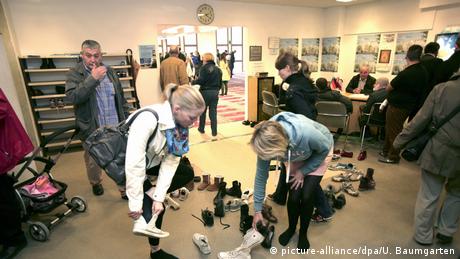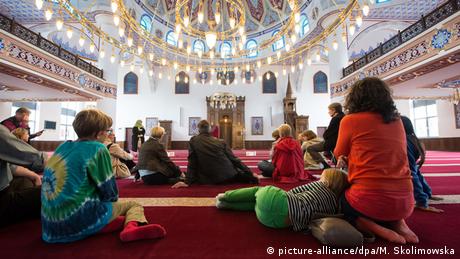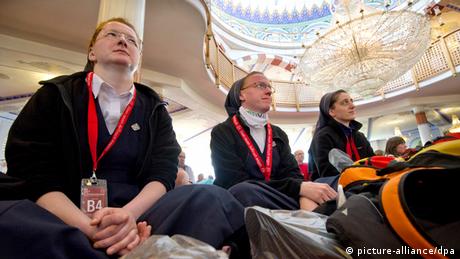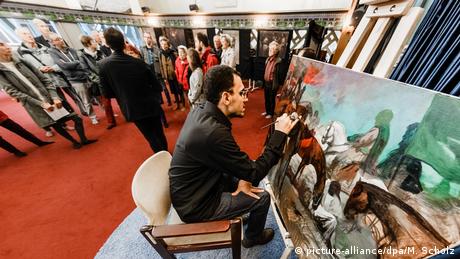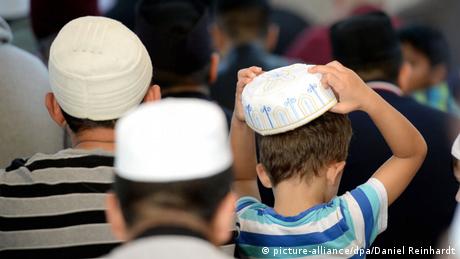More imams with a German diploma, fewer imams from abroad. Berlin wants to push Ankara’s influence on mosque associations and the right of residence exacerbate. With German Muslim communities there?
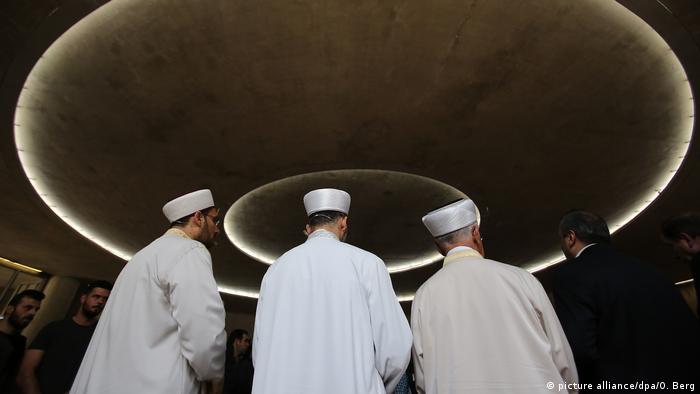
Characters: imams pray at the Islamic day of action against hatred and violence in a Cologne mosque
Murat Gül is an Imam and President of the Islamic Federation in Berlin (IFB). He is teaching Islam to the Rosa Parks elementary school in the capital and says: “Since I was a small Boy, I used to love the Koran.”
The 43-Year-old was born in Weinheim, in the South-West of Germany. The Koran he was reading at home with his father. Later, he went to Turkey, attended a Qur’an course and completed his Islamic studies in Egypt. Gül says he wanted to learn more about Islam, but was “never to be Imam”.
After his return to Germany, Gül applied for a study place. “But then I saw young people who were on drugs and no Plan for their future.” This triggered in him the desire to help children. “So I started to give Islam’s teaching.”
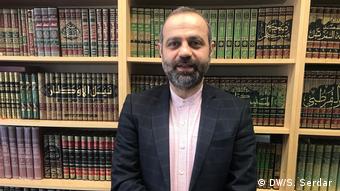
Gül: imams must know the German language and culture
Gül is the Belief that imams in Germany, can German, with the education system and the culture of the country should be aware of where you live. Only an Imam can understand the needs of a Muslim community in Germany and go on.
In Germany, socialized
Of the nearly 4.5 million Muslims in Germany, approximately three million Turkish roots. According to the 2006 by Germany’s interior Ministers convened the German Islam conference (DIK) in Germany in 2000, mosque associations and about 2000 imams. Almost 90 percent of them come from abroad and have not received your training in the Federal Republic of Germany. The majority of them comes from Turkey.
The Federal government wants to change this and the financial and institutional influence on imams from abroad restrict. You will, therefore, promote an “Islam in, from and for Germany” and the number of locally trained imams to increase.
“When young people born and raised in Germany, go to the mosque or an Imam, then it would be of advantage, if the cleric in the mosque, if the Imam has some experience with life and the everyday life in Germany,” said Markus Kerber, state Secretary in the Federal Ministry of the interior, in an interview with DW.

At the Humboldt University in Berlin is set up in this year, a further course of study of Islamic theology
“It’s not a ‘Eindeutschung’ of Islam, but an Islam of Muslims in Germany,” adds Kerber, of the relationship of the Federal government with the Muslims in Germany. Goal is “to show that Muslims living here can be accepted with their Religion here and is the home of feel, and as an enrichment for our country.”
Problem barrier with the language
A solid Plan, such as the local training of imams should look like, but still. Language is a big barrier – and since the Federal government now. The Ministry of the interior recently announced that the government plans to change the German right of residence. Knowledge of German should therefore be a Must for foreign clergy who wish to come to Germany.
This requirement also appears on a list of the Federal Ministry of defense. From there, it was said last week that Islamic chaplains who want to work for the military, must have fluent English and a degree in Islamic theology from an accredited University must have.
In Germany, Islamic theology is taught currently at the universities of Münster, Tübingen, Osnabrück, Frankfurt/ Gießen and Erlangen-Nuremberg. Another Institute will be opened this year at the Humboldt University in Berlin.
How to wash you Late?
But Islamic theology is the one theological practice of the other. According to the assessment by Rauf Ceylan, a Professor at the Institute for Islamic theology at Osnabrück University, qualifying such a study is not automatically for the work as a Imam. After graduation, the graduates need practical experience.
“Read the Qur’an and how to pray correctly, how to go through the Deceased washes our students a scientific training, because we can’t teach you these practical things,” says Ceylan. “It will have an Academy give.” A pilot project for professional development of imams at the University of Osnabrück has been completed in 2018, when the financial support ended.
Foreign Influence
In the debate about foreign influence in the Muslim community in Germany is the Turkish-Islamic Union of the institution for Religion (DITIB) plays a Central role. Imams of the DITIB, with 900 mosques, the largest Islamic organization in Germany, to be trained in Turkey, and from there sent and paid for.
“I see it above all as a Problem, that we are not dealing here only with a religious community, but rather a state that sends these imams,” said the CDU-Bundestag member Christoph de Vries of the DW.
Against the interference of DITIB in national political Affairs have been far-reaching criticism. “We want imams are no longer sent, as in the past, the religious authority of Turkey to Germany, but gradually more and more in Germany-trained imams in the communities of action”, explained state Secretary Kerber.
In the recent past, the DITIB in Germany was a growing number of negative headlines: the espionage allegations, the glorification of the Turkish military attack on the Syrian-Kurdish town of Afrin in DITIB mosques, as well as the participation of members of the Muslim brotherhood in a DITIB-event in January 2019.
The Financing Question
The biggest challenge of all is Polat’s opinion, the green Bundestag deputies Filiz, such as the DITIB mosques would Finance without the support of the Turkish state and their imams. “Currently, the mosque gets a well-trained Imam in vain,” said Polat, the DW. “In the future, you would have to bear the Imam himself.”
Polat refers to the Muslim Ahmediyya community as a positive example. The religious community has about 40,000 members and more than 50 mosques in Germany. “In the case of the Ahmadiyya, it is, for example, that all municipalities pay into a big pot,” says Polat. “Then a solidarity-based distribution will take place accordingly, so that even small municipalities can afford an Imam.”
Watch the Video 03:14 Share
“Foreign influences limit”
Facebook Twitter google+ send Tumblr VZ Xing Newsvine Digg
Permalink https://p.dw.com/p/3AgGU
“More transparency in the financing of mosques”
“In view of the number of Muslims with a Turkish Background, it is definitely affordable,” adds the green MP. “The only question is: Want to be Muslims regardless of their country of origin, and you want an Imam training, which takes place here in Germany, and is financed?”
DITIB is open
DITIB seems to be the receivables to be now open. DITIB Secretary General Abdurrahman Atasoy told the DW that the organization will soon begin a project, in which imams trained in Germany and open positions will be taught.
In the short term, the funds together to get you to pay more than 1000 religious Official, however, is a challenge. “We want to find a System that the German Standards, we are working on that,” says Atasoy. “These mechanisms to build up takes time.”
The German state must stay out of religious Affairs, so it is in the basic law. “The state can and wants to pretend no way,” says Kerber. “But we are now discussing whether and how the state and religious communities cooperate.”


